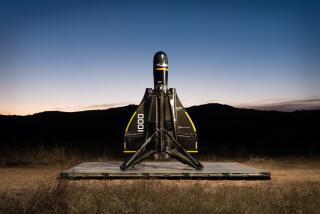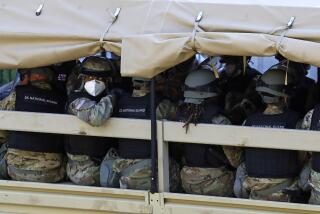Pentagon May Let Firms Do Some Purchasing
- Share via
WASHINGTON — The Pentagon, plagued by costly and politically embarrassing overpriced purchases of coffee makers, ashtrays and toilet covers, is considering turning over a segment of its procurement chores to private companies, the Defense Department’s spare parts chief said Wednesday.
Maurice Shriber, a deputy assistant secretary of defense, said the proposal is part of a plan to learn from private industry the tricks of buying parts more cheaply.
However, he and other Defense Department officials said that the plan is meeting resistance among Pentagon chiefs and that others outside the Pentagon have questioned whether it would save money or simply invite some of those close to the defense industry into the procurement process.
In an interview with The Times, Shriber said the Pentagon, in its effort to avoid what have come to be known as procurement “horror stories,” is studying the private sector, “not in terms of how they sell to the Department of Defense, but how they buy for themselves.”
“We’re going to look at one or two airlines, at an automotive company (and) a service organization” such as IBM or Xerox, he said, adding: “There are companies that actually sell procurement services. They buy things. One of the things that we’ve met most resistance on, and we’d like to at least try it as a test, is to contract out the procurement process.”
Shriber has told Congress that 1,000 Defense Department procurement offices make 15 million purchases a year from 300,000 contractors.
“We’re just getting swamped with the numbers of actions we have to perform each day,” and it is “a lot of these smaller dollar value items that lead to a horror story,” he said in the interview.
If the Pentagon could rid itself of these purchases, “we could concentrate more on the high dollar value, high demand items,” he noted.
The “smaller dollar items” have been costly to the Pentagon.
In recent months, it has been disclosed that the Navy paid more than $600 each for replacement ashtrays for E-2C Hawkeye radar airplanes and $404 for a socket wrench--purchases for which rebates were later made. The Pentagon also paid $7,622 for an airborne coffee machine, $640 for a toilet cover and $748 for a pair of pliers.
One senior Pentagon official, speaking on the condition that he not be identified, said opposition in the Defense Department to outside buying by “professional shoppers” stems from employees’ concern about possible loss of jobs and the military services’ concern that they could lose control over what they buy and when they buy it.
“They’re all parochial,” he said of the individual points of opposition, while predicting that if Shriber pursues the idea, “he’s going to have to fight hard.”
A frequent critic of Pentagon spending, Gordon Adams, director of the Defense Budget Project, questioned whether a private company could be independent of the defense industry.
“It’s like inviting the shoplifters into the store,” he said. But he added that “it’s consistent with the Reagan Administration’s approach of contracting out--to find people who can do this more cheaply in the private sector, whether it’s collecting garbage or buying F-16s.”
Another critic of Pentagon procurement procedures, David Pryor (D-Ark.), president of the Senate segment of the congressional Military Reform Caucus, said that “any new idea is worth discussion.” But he warned that “anytime we contract out what normally has been a public function, it’s really hard to know what the real costs are.”
More to Read
Inside the business of entertainment
The Wide Shot brings you news, analysis and insights on everything from streaming wars to production — and what it all means for the future.
You may occasionally receive promotional content from the Los Angeles Times.










